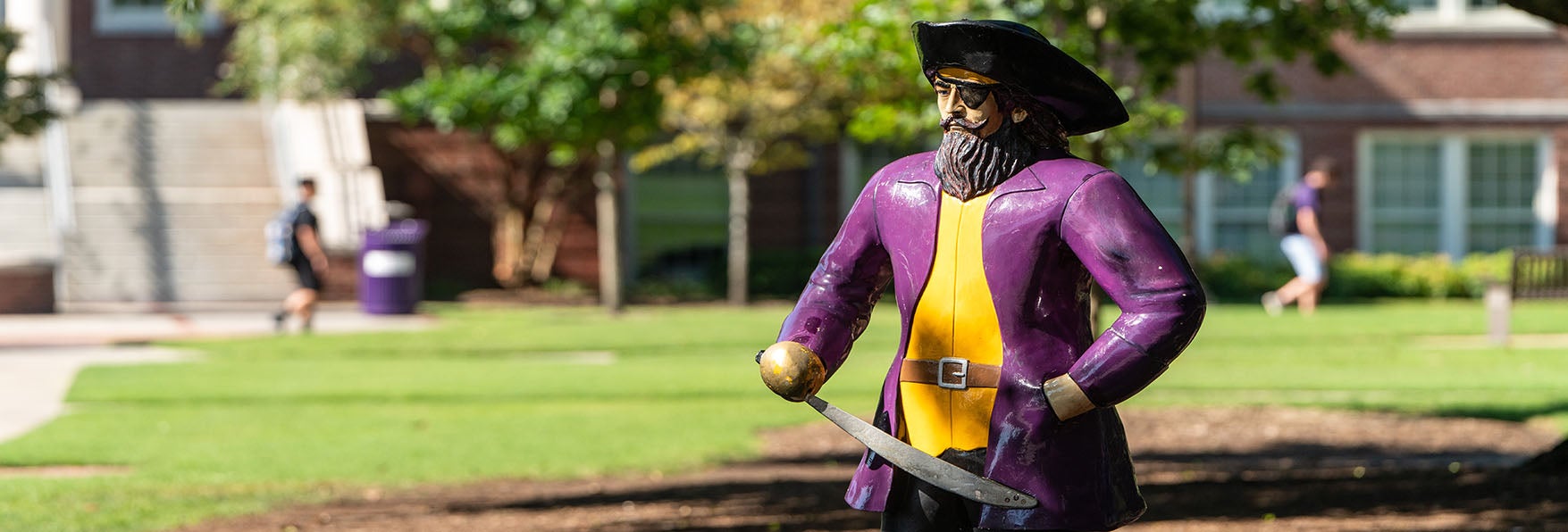MS in Athletic Training_backup
The Master of Science in Athletic Training degree will prepare students to become certified athletic trainers and to practice athletic training in workplaces such as high schools, colleges and universities, industry, performing arts, military, and medical clinics. Athletic training education at East Carolina University has a storied fifty-year history, with graduates working in every type of workplace setting and at sporting levels ranging from youth to professional.
The mission of the program is to develop graduates who are confident and prepared to deliver evidence-based healthcare to the physically active. Our mission is to remain a national leader in preparing students to work in the traditional, team-based, athletic trainer position.
The ECU MSAT program strives for excellence in student success. Graduates will:
— Pass the Board of Certification examination;
— Employ an evidence-based paradigm (integrating research, clinical experience, and patient needs/values) to formulate clinical decisions that optimize patient health care and services;
— Exhibit professional behaviors and consistency with the legal and ethical practice of athletic training;
— Possess the tools necessary for continued professional growth and participation in activities including scholarship, mentorship, and service.
While the MSAT does not possess three-year first-time pass rates for this exam at this time, the three-year first-time pass rate for the BOC exam for the ECU BSAT degree is 98% (100% pass rate regardless of attempt) which exceeds the 3-year pass rate established by the CAATE.
Program Accreditation:
The Master of Science in Athletic Training degree is accredited by the Commission on Accreditation of Athletic Training Education (CAATE).Students who graduate from an accredited program become eligible to sit for the credentialing national Board of Certification examination for athletic trainers and attain licensure to practice in most states.
Admissions Requirements:
— Bachelor’s degree from an accredited institution
— Qualify for admission to the ECU Graduate School including, but not limited to, satisfactory GRE scores
— 3.0 (4.0 scale) on all undergraduate coursework
— Prerequisite coursework and have earned a grade of C or better in each course (sh = semester hours):
- General biology with lab (4 s.h.)
- General chemistry with lab (4 s.h.)
- General physics with lab (4 s.h.)
- Human anatomy and physiology with labs (8 s.h.)
- Psychology (3 s.h.)
- Nutrition (3 s.h.)
- Biomechanics (3 s.h.)
- Exercise physiology (3 s.h.)
- Statistics (3 s.h.)
Application Process:
Application to the ECU MSAT requires a two-step process. There is a fee for each application and prospective students must complete both applications prior to being considered for admission.
STEP 1: Apply to ATCAS and upload all required documentation to include:
- unofficial transcripts and requests for transcript verification from each institution of higher education;
- GRE scores (use code 5180);
- written statement of purpose and professional goals;
- two letters of recommendation attesting to the applicant’s character and academic competence or ability to do graduate work and these must be from each of the following: one recommendation must be from an academic faculty member and one from the athletic trainer who supervised the majority of the observational hours;
- 50 observational hours (Recorded on this form) in a scholastic and/or collegiate athletic training setting within 24 months prior to application which must be verified and signed by a supervising athletic trainer;
- completed and signed Technical Standards;
- copy of emergency cardiac care certification (ECC) from a BOC approved provider and first aid certification.
STEP 2: Apply to the ECU Graduate School to enroll in the MSAT.
Program Acceptance:
Review of applications is rolling and application decisions will begin February 1st and will continue until all available seats are filled or until April 15th is reached. Therefore, students are encouraged to complete the application process as soon as they are able.
Program Requirements:
Students invited for admission into the degree program will be required to provide the ECU Graduate School with official transcripts prior to enrollment. Also, students must be cleared following a pre-participation physical and provide evidence of required immunizations. Students will be responsible for program-associated expenses, including transportation associated with clinical experiences.
Graduate athletic training students must remain in good standing in accordance with the Graduate School’s Academic Eligibility Standards and University student conduct policies. All students in the degree are required to maintain required immunizations for the duration of their involvement in the curriculum.
Program Coursework:
This program is only offered in an on-campus, face to face format. Students matriculate through the 57 s.h. curriculum as part of a cohort following a prescribed sequence of courses spanning two consecutive years. The Athletic Training Program at ECU does not accept transfers of courses/credits from other AT education programs.
Program Faculty:
Katie Walsh Flanagan, EdD, LAT, ATC
Professor and co-Program Director
Scales FH 130C
flanagank@ecu.edu
252-737-4561
Sharon Rogers Moore, PhD, LAT, ATC
Associate Professor and co-Program Director
Scales FH 130D
rogerssh@ecu.edu
252-737-2982
Andrew Pickett, MAEd, LAT, ATC
Teaching Instructor and Clinical Coordinator
Scales FH 130B
picketta@ecu.edu
252-737-1477
For more information contact: MSAT@ecu.edu
